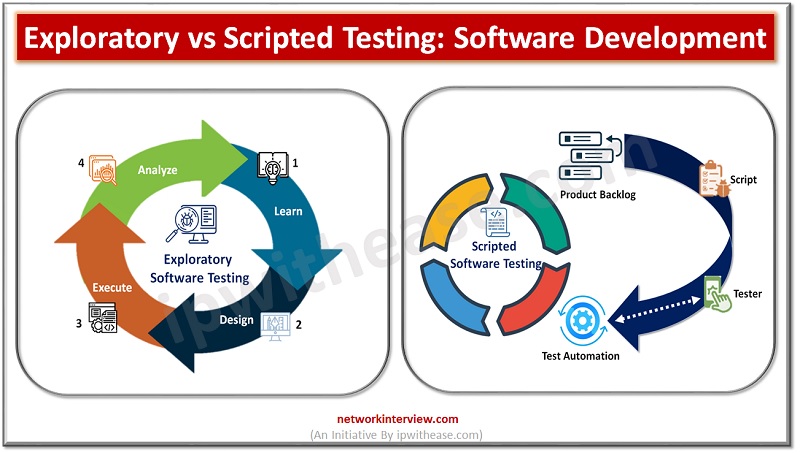In recent years, there has been a noticeable shift in software testing methodologies from traditional scripted approaches to more dynamic and exploratory methods. Scripted testing, which has long been a cornerstone of quality assurance practices, ensuring systematic validation of software functionalities against predetermined criteria.
However, as software development processes evolve to embrace agile methodologies and continuous delivery, the limitations of scripted testing in capturing real-world usage scenarios and unexpected defects have become apparent. This has led to the rise of exploratory testing, which emphasizes flexibility, creativity, and real-time interaction with the software under test.
What is Exploratory Testing?

Exploratory Testing Illustration
Image Credit: AgileTest
Exploratory testing is a hands-on, simultaneous approach to learning about the software and testing it. Unlike scripted testing, where test cases are predefined and followed step-by-step, exploratory testing involves real-time test design and execution. The key characteristics of exploratory testing include:
– Simultaneous Test Design and Execution: Tester’s design and execute tests as they explore the application.
– Adaptive and Interactive: The approach is highly adaptive, allowing testers to respond to what they learn in real-time.
– Tester-Driven: The process relies heavily on the tester’s skills, intuition, and experience.
A Comparison with Traditional Testing Methods
Comparison with traditional testing methods reveals stark contrasts between exploratory testing and scripted testing. Scripted testing relies on pre-written test cases executed in a controlled manner, adhering strictly to predetermined steps and expected outcomes. This method offers consistency and reproducibility but can be inflexible when unexpected scenarios arise. In contrast, exploratory testing thrives on flexibility, allowing testers to adapt their approach based on real-time findings and insights. This adaptability enables exploratory testers to explore diverse pathways and scenarios that scripted tests might overlook.
Moreover, exploratory testing encourages creativity and innovation among testers. Unlike the structured environment of scripted testing, where testers follow predefined scripts, exploratory testing empowers testers to think critically and creatively. Testers can delve into the software’s functionalities, leveraging their domain knowledge and intuition to uncover potential defects or usability issues that scripted tests may not detect. This dynamic approach not only enhances problem-solving skills but also encourages a more thorough exploration of the software’s capabilities.

A Comparison of Exploratory Testing with Scripted Testing Method
Image Credit: Networkinterview
The documentation practices also differ significantly between the two methods. Scripted testing necessitates comprehensive documentation of test cases and expected outcomes before execution begins. On the other hand, exploratory testing emphasizes real-time note – taking and learning during the testing process. Testers document their observations, insights, and test results as they navigate through the application, providing immediate feedback and facilitating quicker identification and resolution of issues. This agile documentation approach supports iterative testing cycles and aligns well with agile and DevOps practices, where rapid feedback and continuous improvement are paramount.
Exploratory testing not only complements scripted approaches by filling gaps in test coverage but also enables testers to adapt quickly to changing requirements and discover critical issues early in the development lifecycle. This transformation really marks a pivotal moment in software testing, where adaptability and innovation are key drivers of improved software quality and customer satisfaction.
Key Techniques in Exploratory Testing
Key Techniques in Exploratory Testing encompass a variety of structured and collaborative approaches tailored to enhance software quality and efficiency:
– Session-Based Testing: Session-based testing involves conducting time-boxed testing sessions with predefined objectives and goals. Testers allocate specific time periods to focus on exploring and testing different aspects of the software systematically. This method ensures a structured approach to exploratory testing, facilitating efficient management and documentation of testing efforts.
Freestyle Exploratory Testing: Freestyle exploratory testing provides testers with unrestricted freedom to explore the software application intuitively. This is particularly valuable during initial exploration phases or when novel perspectives are needed to uncover unforeseen defects or usability issues.
Charter-Based Testing: Charter-based testing involves creating test charters that outline specific areas of the software to be tested and the objectives to be achieved during testing sessions. Test charters serve as guiding documents that provide focus and direction while preserving the flexibility inherent in exploratory testing. This method helps testers prioritize testing tasks based on critical business functionalities or areas prone to defects.
Pair Testing: Pair testing involves two testers collaborating closely on the same testing tasks or scenarios. This collaborative approach enhances problem-solving abilities and fosters knowledge sharing between team members. This method is particularly beneficial for complex testing scenarios or when multiple viewpoints are needed to ensure thorough test coverage and robust software quality assurance.
Common Obstacles in Exploratory Testing

Common Obstacles in Exploratory Testing
Image Credit: TMAP
Lack of Structure: Inherent lack of predefined scripts or test cases can initially make the testing process appear unstructured and chaotic, especially to those accustomed to more rigid testing methodologies. Testers rely on their intuition and domain knowledge to guide their testing efforts, which can sometimes lead to inconsistency in testing approaches across different sessions or testers.
Time Constraints: The adaptive and flexible nature of exploratory testing can also pose challenges in terms of time management. Testers may find it challenging to balance the exploration of the software with the need to adhere to project timelines and deadlines.
Measuring Coverage: Exploratory testing relies on testers’ exploration paths and findings. As a result, it can be difficult to quantitatively assess how much of the application has been tested and to identify potential gaps in test coverage.
SmartDev’s Advanced Exploratory Testing Solutions
SmartDev leads the charge in software development and quality assurance, renowned for its dedication to excellence and innovation. Offering a wide array of testing services, including expertly executed exploratory testing, SmartDev’s seasoned team utilizes cutting-edge tools and industry best practices to maintain unparalleled standards of software quality. As holders of ISO certification, we prioritize continuous improvement and uphold rigorous quality benchmarks.
Harnessing SmartDev’s expertise in exploratory testing empowers businesses to proactively identify and rectify defects early in the development cycle, ensuring robust and dependable software products. Our customized testing strategies are meticulously tailored to meet your specific needs, guaranteeing thorough evaluation and readiness for market launch.
Partner with SmartDev to elevate your QA processes, fortify your software’s reliability, and deliver exceptional products that exceed expectations.






